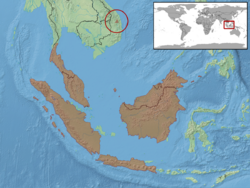Biology:Boiga drapiezii
| White-spotted cat snake | |
|---|---|
| Scientific classification | |
| Domain: | Eukaryota |
| Kingdom: | Animalia |
| Phylum: | Chordata |
| Class: | Reptilia |
| Order: | Squamata |
| Suborder: | Serpentes |
| Family: | Colubridae |
| Genus: | Boiga |
| Species: | B. drapiezii
|
| Binomial name | |
| Boiga drapiezii (F. Boie, 1827)
| |

| |
| Synonyms[2] | |
| |
Boiga drapiezii, commonly known as Drapiez's cat snake and the white-spotted cat snake, is a species of long and slender rear-fanged snake in the family Colubridae. The species is native to Maritime Southeast Asia and is common throughout its range.
Etymology
The epithet, drapiezii, is in honor of Belgian naturalist Auguste Drapiez.[3]
Description
There are two known phases of B. drapiezii. The green phase has a marbled green body with a more robust head and width. The brown phase is much more slender with orange brown triangle-like bands across the body.[citation needed] This species is in need of urgent review, with possibly subspecies awaiting discovery and subsequent description.[citation needed]
Geographic range
B. drapiezii is found in Borneo, Indonesia, Peninsular Malaysia, the Philippines , Singapore, and Thailand, Vietnam.[1]
Habitat
The preferred natural habitat of B. drapiezii is forest, at altitudes of 80–900 m (260–2,950 ft).[1]
Behavior
The white-spotted cat snake is nocturnal and arboreal.[1] It can often be found moving about on the forest floor in search of prey and travel.[citation needed] It is found in tropical rainforest, sometimes on branches near streams.[citation needed]
Diet
In the wild, the white-spotted cat snake preys upon frogs, geckos, and other small lizards,[1] as well as insects, birds, and bird eggs.[4]
Reproduction
References
- ↑ 1.0 1.1 1.2 1.3 1.4 Grismer L, Chan-Ard T, Ananjeva NB, Orlov NL, Dehling M (2013). "Boiga drapiezii ". The IUCN Red List of Threatened species 2013: https://dx.doi.org/10.2305/IUCN.UK.2013-1.RLTS.T192020A44271014.en. Accessed on 16 September 2022.
- ↑ 2.0 2.1 Species Boiga drapiezii at The Reptile Database www.reptile-database.org.
- ↑ Beolens, Bo; Watkins, Michael; Grayson, Michael (2011). The Eponym Dictionary of Reptiles. Baltimore: Johns Hopkins University Press. xiii + 296 pp. ISBN:978-1-4214-0135-5. (Boiga drapiezii, p. 75).
- ↑ Das I (2006).
Further reading
- Boie F (1827). "Bemerkungen über Merrem's Versuch eines Systems der Amphibien, 1. Lieferung: Ophidier ". Isis von Oken, Jena 20: 508–566. (Dipsas drapiezii H. Boie, new species, p. 549). (in German and Latin).
- Boulenger GA (1896). Catalogue of the Snakes in the British Museum (Natural History). Volume III., Containing the Colubridæ (Opisthoglyphæ and Proteroglyphæ) ... London: Trustees of the British Museum (Natural History). (Taylor and Francis, printers). xiv + 727 pp. + Plates I-XXV. (Dipsadomorphus drapiezii, pp. 74–75).
- Das I (2006). A Photographic Guide to Snakes and other Reptiles of Borneo. Sanibel Island, Florida: Ralph Curtis Books. 144 pp. ISBN:0-88359-061-1. (Boiga drapiezii, p. 23).
External links
Wikidata ☰ Q2716241 entry
 |


